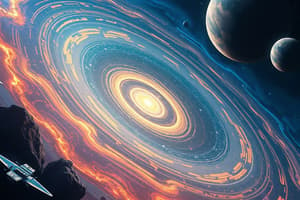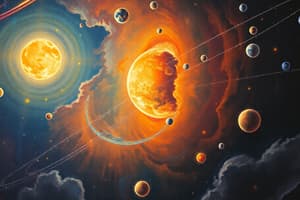Podcast
Questions and Answers
How far is the solar system located from the center of the Milky Way Galaxy?
How far is the solar system located from the center of the Milky Way Galaxy?
28,000 light years
What theory describes the formation of our solar system?
What theory describes the formation of our solar system?
Solar nebular hypothesis
Approximately how long ago was the solar system formed?
Approximately how long ago was the solar system formed?
4.5 billion years ago
What was the primary method used by Ptolemy to explain the motion of planets?
What was the primary method used by Ptolemy to explain the motion of planets?
According to Kepler, what shape is the orbital path of every planet?
According to Kepler, what shape is the orbital path of every planet?
What is the average eccentricity of Earth’s orbit?
What is the average eccentricity of Earth’s orbit?
How long does it take Mercury to orbit the Sun?
How long does it take Mercury to orbit the Sun?
What is Venus's average speed in its orbit around the Sun?
What is Venus's average speed in its orbit around the Sun?
What is the average distance of Earth from the Sun?
What is the average distance of Earth from the Sun?
How long does it take Mars to orbit the Sun?
How long does it take Mars to orbit the Sun?
How long does it take Jupiter to orbit the Sun?
How long does it take Jupiter to orbit the Sun?
How long does it take Saturn to complete its orbit around the Sun?
How long does it take Saturn to complete its orbit around the Sun?
What is unique about Uranus's tilt in comparison to its orbit?
What is unique about Uranus's tilt in comparison to its orbit?
How long does a complete orbit around the Sun take Neptune?
How long does a complete orbit around the Sun take Neptune?
Flashcards are hidden until you start studying
Study Notes
Formation of the Solar System
- Solar system located in the Milky Way Galaxy, 28,000 light years from the center.
- It revolves around the Milky Way's center approximately every 240 million years.
- Solar nebular hypothesis explains formation from a nebula of dust and gas, producing the sun, planets, moons, and asteroids around 4.5 billion years ago.
Historical Models of Planetary Motion
- Ptolemy introduced epicycles to explain the complex motion of planets, accounting for retrograde movements observed over time.
Orbital Characteristics of Planets
- Kepler’s 1st Law indicates that planets orbit in elliptical paths, though they are nearly circular with low eccentricity.
- Earth's average orbital eccentricity is 0.017, indicating its orbit is 98.3% circular.
Planetary Orbits and Speeds
- Mercury orbits the Sun every 88 Earth days at speeds of nearly 112,000 mph, with a highly elliptical orbit ranging from 29 to 43 million miles from the Sun.
- Venus has an orbital period of 0.615 Earth years (approximately 224.7 days) with an average speed of 78,341 mph.
- Earth orbits at an average distance of 149.6 million km (92.96 million mi) in 365.256 days, equivalent to 940 million km traveled per year.
- Mars completes its orbit every 1.88 Earth years (686.93 days) at an average speed of 53,979 mph.
Giant Planets
- Jupiter's orbital period is 11.86 Earth years (4,330.6 days) with an average speed of 29,236 mph.
- Saturn takes approximately 29.4 Earth years (10,756 Earth days) for one orbit, with a rotation period of 10.7 hours.
- Uranus orbits the Sun in about 84 Earth years (30,687 Earth days) and has a unique axial tilt of 97.77 degrees, likely due to a past collision.
- Neptune completes an orbit in about 165 Earth years (60,190 Earth days) with a rotation period of 16 hours.
Studying That Suits You
Use AI to generate personalized quizzes and flashcards to suit your learning preferences.




